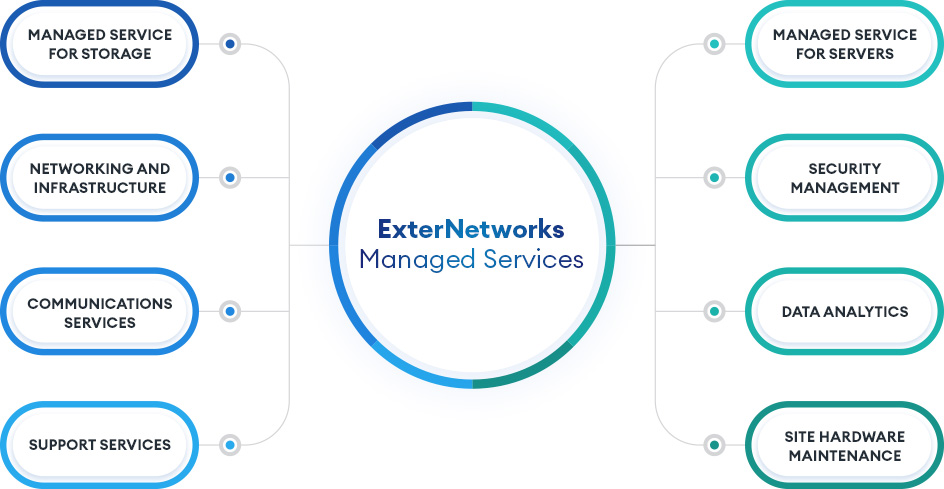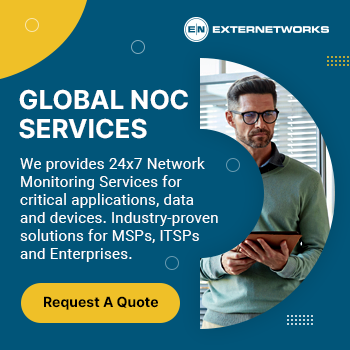What is a Managed Data Center Service?

As IT necessities are perhaps one of the most important and foundational elements of any growing business, infrastructure norms are not only changing, but being changed by the leverage of more sophisticated technology. For this reason, offsetting the operational cost of running every element of an IT network and having that provided by a reliable third party like ExternetWorks is increasing in popularity. For that, and more, you may consider a solid data center managed service.
What is a Data Center Managed Service?
With a managed data center support service, you can ensure that your cloud and IT infrastructure are optimized. You can have your managed data center partially or fully managed through a managed service platform. This means that you can ensure your third-party hosting is reliable, always maintained and secure while still exercising some degree of administrative control.
What is included in Managed Data Center Services?
Depending on the package you opt for, this can differ. The most common services include the upkeep and maintenance of hardware and network services. Data center store and backup maintenance are usually essential services. Fault tolerance and disaster planning and recovery is a crucial addition regularly prioritized. Furthermore, the upgrading and patching of operating systems and software where appropriate is handled for you.
What is a Data Center as a Service?
DCAAS is a hosting service that allows physical data center infrastructure to be provided to clients, meaning that all essential server installations and maintenance are off-site, at a third-party location, closely guarded, and cared for. This all but removes logistical and budgetary limits that your business may have trying to establish on your own, which may have otherwise been a preventative measure for your business staying in business.
Role of Data Center Managed Services
Data center managed services play a crucial role in allowing organizations to streamline their IT operations and focus on strategic business initiatives. By outsourcing the management of data center facilities, companies can alleviate the burden on their internal IT staff or even eliminate the need for these personnel altogether. This shift enables organizations to redirect their resources toward managing critical applications and meeting core business objectives rather than getting mired in the complexities of infrastructure maintenance. The managed service provider (MSP) ensures that the data center operates at optimal performance levels, providing reliability and support for IT equipment necessary for seamless day-to-day operations.
To foster a clear understanding of expectations between the MSP and the organization, service level agreements (SLAs) are typically established. These SLAs outline specific performance metrics, availability guarantees, response times for issues, and each party’s responsibilities in maintaining the health of the data center. Organizations often turn to managed services when facing challenges such as unplanned service outages, an inadequate monitoring system for their infrastructure, or hurdles in hiring and training staff to keep up with evolving demands. In this context, data center-managed services not only help mitigate potential risks associated with operational downtime but also enable businesses to optimize their IT capabilities and enhance overall productivity.
What are the Types of Managed Services?
There are many types of managed services on offer, and the degree to which they are applied will depend on which provider you opt for.
ExterNetworks provides Managed Service for Storage, Managed Service for Servers, networking and infrastructure, security management, communications services, data analytics, support services, on-site hardware maintenance, and more. Feel free to see our full list of options here.

Types of Data Center Managed Services
Data Center Managed Services encompass a range of services that help organizations optimize, monitor, and maintain their data center operations. These services support various IT infrastructure needs, enhance efficiency, ensure uptime, and address security requirements, making data centers more reliable and adaptable to changing business demands. Here are some core types of Data Center Managed Services:
Infrastructure Management Services
Infrastructure Management is fundamental to any data center, involving the oversight of servers, storage, network components, and other hardware resources. Providers manage the physical and virtual components of the infrastructure to ensure it operates smoothly and can handle the demands placed on it. This includes monitoring hardware health, optimizing performance, and replacing or upgrading equipment as needed. Effective infrastructure management enhances operational efficiency, minimizes downtime, and helps organizations save on costs by maintaining stable and scalable environments.
Network Management Services
Network management services ensure that all networking aspects of a data center, including switches, routers, firewalls, and other connectivity devices, are functioning correctly. These services involve monitoring network performance, managing bandwidth, securing data traffic, and troubleshooting issues to maintain optimal speed and connectivity. Additionally, network management includes implementing security measures like firewalls, VPNs, and intrusion detection systems to protect the data center from cyber threats. Reliable network management supports business continuity and provides a seamless experience for end-users and applications reliant on fast and secure data flow.
Storage and Backup Management Services
Storage and backup management are crucial for data reliability and availability. Data Center Managed Services providers handle the storage allocation, maintenance, and backup processes to protect data from potential loss. They ensure that data backups are scheduled, regularly tested, and easily recoverable in case of system failure or data breach. Managed storage services also involve optimizing data storage solutions, such as SAN (Storage Area Network) and NAS (Network Attached Storage), to meet the organization’s capacity, performance, and compliance requirements. These services allow businesses to store and retrieve data securely and efficiently.
Security Management Services
Security management services focus on protecting the data center against internal and external threats. This service includes monitoring for vulnerabilities, managing access controls, performing regular security audits, and ensuring compliance with regulatory standards like GDPR or HIPAA. Managed security services implement firewalls, encryption, intrusion detection systems, and endpoint protection to safeguard sensitive data and critical systems. By outsourcing security management, organizations can reduce the risk of data breaches, avoid compliance penalties, and benefit from the expertise of cybersecurity professionals who can address complex security needs.
Disaster Recovery and Business Continuity Services
Disaster Recovery and Business Continuity (DR/BC) services prepare data centers to handle unexpected disruptions, such as power outages, cyberattacks, or natural disasters. These services involve creating and maintaining backup systems, implementing failover protocols, and conducting regular recovery testing to ensure rapid response and minimal downtime during a crisis. DR/BC services help companies protect their data integrity, resume operations quickly, and safeguard their reputation by maintaining availability and reliability for clients and stakeholders.
Compliance Management Services
Compliance management services assist organizations in meeting the regulatory and industry standards required for data center operations. Providers ensure that data handling, storage, and access practices comply with laws such as GDPR, HIPAA, PCI-DSS, and others relevant to specific industries. Compliance management includes documentation, regular audits, and implementing policies and procedures that mitigate risks and adhere to legal requirements. By maintaining compliance, businesses avoid legal issues, build client trust, and secure partnerships with other businesses that rely on compliant practices.
Application Management Services
Application management services monitor and maintain the applications hosted within a data center, ensuring they run efficiently and are accessible to users. These services include performance optimization, software updates, and troubleshooting issues to enhance application reliability and user experience. Application management also involves patch management and compatibility testing, which are essential for security and efficiency. Organizations benefit by having applications managed by experts, freeing their internal IT teams to focus on core projects while maintaining high application availability and performance.
Cloud Integration and Hybrid Management Services
Cloud Integration and Hybrid Management Services support the integration and management of cloud resources with existing on-premises data centers. As many organizations adopt hybrid or multi-cloud strategies, this service enables seamless operation across multiple environments, including public, private, and hybrid clouds. Providers handle data migration, connectivity, and workload balancing between cloud and on-premises resources, optimizing for cost-effectiveness and performance. This flexibility allows organizations to scale resources up or down based on demand and harness the advantages of both on-premises and cloud infrastructures.
Data Center Managed Services allow companies to enhance their data center’s operational efficiency, security, and compliance while reducing costs and focusing on core business functions. By leveraging these services, organizations gain access to specialized expertise, advanced tools, and robust processes that optimize their data center performance, supporting growth and innovation.
Benefits of Managed Data Center Services
- Cost Efficiency: By outsourcing data center management, businesses can reduce operational costs associated with hiring and training in-house IT staff, hardware procurement, and system maintenance. Managed services provide predictable monthly expenses, which help with budgeting and financial planning.
- Scalability: Managed data center services allow companies to scale resources according to business needs. This flexibility is especially valuable for growing businesses, as it ensures they only pay for the resources they use and can easily scale up as demand increases.
- Enhanced Security and Compliance: Service providers bring specialized expertise in cybersecurity and regulatory compliance, ensuring that data centers operate within legal frameworks. This proactive security minimizes risks and protects business data from breaches and compliance penalties.
- Focus on Core Business: Businesses can focus more on strategic goals and core operations by entrusting data center management to experts. This frees up internal resources, allowing companies to innovate and remain competitive in their respective markets.
- Access to Advanced Technology: Managed service providers keep data centers up-to-date with the latest technology and tools, ensuring high performance and competitiveness. Access to state-of-the-art technology enhances efficiency and enables businesses to leverage innovations they might not otherwise afford in-house.
Challenges of Data Centre Management
Energy Efficiency and Power Management
Data centers consume vast amounts of power, making energy efficiency a top concern. Balancing high performance with energy costs is a major challenge, especially as data centers expand. Managers must constantly monitor power usage effectiveness (PUE) and explore green solutions like renewable energy sources and advanced cooling techniques to reduce operational costs.
Scalability and Capacity Planning
With data demand rapidly increasing, data centers need to scale efficiently to accommodate new services and storage requirements. Poor capacity planning can lead to either wasted resources or insufficient processing power and storage space. Managers must analyze current usage trends and predict future needs to maintain optimal performance without overspending on unnecessary resources.
Security and Data Protection
As data centers store and process vast amounts of sensitive information, they are prime targets for cyberattacks. Ensuring robust physical and cyber security measures, like access control, firewalls, and encryption, is critical. Regular audits, vulnerability assessments, and compliance with industry standards (like ISO, GDPR, etc.) are essential to protect against potential breaches.
Downtime and Disaster Recovery
Data center downtime can lead to significant business losses. Ensuring high availability and creating effective disaster recovery plans to handle unexpected outages or natural disasters is a top priority. Managers must implement redundancy failover systems and have comprehensive business continuity and recovery plans to minimize disruption.
Infrastructure and Hardware Maintenance
Regular maintenance and hardware upgrades are crucial for data center efficiency. However, they come with challenges such as high costs, downtime risks, and the need to stay current with rapidly advancing technology. Managers must strategize to balance maintenance costs with the lifecycle of equipment and schedule updates that minimize service interruptions.
Effective data center management requires a proactive approach to address these challenges, along with constant monitoring, updates, and adapting to emerging technologies and industry trends.
Frequently Asked Questions
The most frequently asked questions we hear regarding these topics are::
What is a managed data center?
A managed data center is a form of data center model that is carefully deployed, cohesively managed, and routinely monitored by a third-party data center service provider. This ensures a one-stop shop for all of your IT support needs.
What are the Benefits of Managed DataCenter Services?
Managed data center services are essential for any business that needs to store large amounts of information. The main benefit of managed data centers is that they provide 24/7 monitoring and maintenance services. You don’t need to worry about power outages, hardware failures, or other issues that could cause downtime.
What Services are Provided By a Managed DataCenter Service Companies
Managed data centers provide services such as power backup, network connectivity, security, cooling, and physical space for servers. They also offer 24/7 monitoring and maintenance of the equipment. The main benefit of using a managed data center is that they are able to provide all these services at a lower price than what you would be charged if you were to build your own server room.
What is the difference between a managed data center and an entirely managed one?
A managed data center tends to provide you the full functionality, maintenance, and monitoring regarding the upkeep and health of your systems without taking the administrative control from your hands. An entirely managed one ensures all of the back-end data center administrators is performed by the data center provider.
What services are offered?
Of course, this will depend on the service level agreement and the package you have opted for. However, the standard and most popular options include the upkeep and maintenance of all hardware and network equipment, the patching and necessary upgrades of operating systems, data center storage, fault tolerance, and more.
How much does managed service provider cost?
Individual prices will differ depending on the provider used and the scope of your service needs. However, most providers will tend to make this ease-of-access philosophy regarding modern IT infrastructure and server hosting and apply it to their pricing strategy.
This means that many providers will charge a flat monthly fee for their services, reducing or expanding depending on how many services you opt for, and what addons you may wish to integrate with your package. Be sure to see what bundles or options are available when onboarding through a given provider.
What services do ExterNetworks offer?
EtxerNetworks are proud to offer a proactive approach to the full suite of services for our data center customers, which are always geared to help them meet staff and user demands. We also offer a range of network security services as well as thorough network management options. This is by no means our limit, as we also specialize in cloud and comprehensive disaster recovery services.
Feel free to speak to us regarding any questions you have about this process and how it can be maximally applied and optimized to and for your firm. We’re here to help and to field any queries you may have. Contact us now!
to Contact Us




